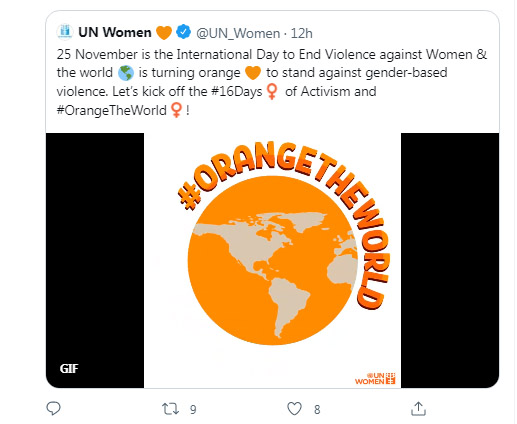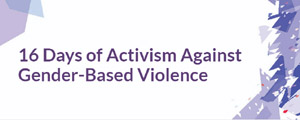Thursday November 25, 2021 | VANCOUVER ISLAND, BC
Editorial overview by Mary P Brooke | Island Social Trends
Today November 25 is the International Day for the Elimination of Violence against Women 2021.
This launches 16 days of activism to be concluded on the 10th of December 2020 — the day that commemorates the International Human Rights Day. This strategy was started in 2008, and continues each year to call for global action to increase awareness, promote advocacy and create opportunities for discussion on challenges and solutions.
“A future without violence against women is possible with education, essential services across policing, justice, health, and social sectors, and sufficient financing dedicated to women’s rights,” says the United Nations.

In Canada, the annual National Day of Remembrance and Action on Violence Against Women on December 6 (remembering the victims and impacts of the Montreal massacre in which 14 women were murdered based on their gender) falls within the 16-day period of the broader campaign. International Women’s Day falls on March 8 each year.
“Achieving a Canada free from gender-based violence requires everyone living in this country to educate themselves and their families and communities on gender-based violence, centre the voices of survivors in our actions and speak up against harmful behaviours,” it is stated by the Government of Canada.
Deaths in 2020 and 2021:
In Canada, every six days a woman is killed by her intimate partner, says NDP Leader Jagmeet Singh. He adds that thousands of women and their children have to sleep in shelters because their home isn’t safe, and that it shouldn’t have to be this way.
In 2020 during the height of the pandemic, 160 women and girls were killed, and in the first half of this year another 92. A disproportionate number were Indigenous women and girls, who were possibly disadvantaged economically.
A National Action Plan to end gender-based violence is proposed by the NDP.
Proposed new federal legislation on coercive behaviour:
Today in the House of Commons (44th parliament), NDP Justice Critic Randall Garrison, MP (Esquimalt-Saanich-Sooke) reintroduced legislation to address increasing rates of intimate partner violence by creating a new Criminal Code offence for coercive and controlling behaviour. Bill C-202 would create an important tool to address violence that happens in intimate partner relationships that is currently not included in the Criminal Code, while also giving law enforcement the ability to intervene before dangerous situations escalate.
Garrison first introduced that legislation in the previous (43rd) parliament in 2020, as Bill C-247, in response to “an alarming spike in intimate partner violence that was brought to light during the early months of the pandemic,” said Garrison in a news release today.
He hopes the new bill will not ‘die on the order paper’ (which happened when the September 2021 election was called). The bill previously received cross-party support and a unanimous recommendation from the Standing Committee on Justice and Human Rights.
“I heard from constituents, women’s groups, frontline service providers, and law enforcement that creating a new Criminal Code offence for coercive control was needed as a means of providing a mechanism to break the cycle of coercive violence before it escalates to physical violence,” Garrison said today.
This bill doesn’t necessarily address broader concerns around how police handle domestic and ‘wellness check’ calls, and may not encompass the reasons for escalation of tension in relationships, including financial and social pressures.
There is also the danger of wading into that realm which the late Prime Minister Pierre Trudeau famously said that “there is no place for the state in the bedrooms of the nation”. Not that violence is in any way normal, but that intimate partner relationships are just that — intimate — and that’s a realm fraught with complexities that become further challenged with the introduction of police and criminal boundaries.
An unintended consequence of such legislation may be that people are less likely to commit to live-in relationships, and all the social tensions and ramifications of that. Women who are able to financially support themselves are in a better position to make conscious choices about healthy relationships; the underpinning to financial success is having an effective level of education.
BC commitment:
The BC government issued a statement today from Premier John Horgan and Parliamentary Secretary for Gender Equity, Grace Lore, with the Ministry of Finance – Gender Equity Office.

“As a government we recognize our responsibility to address gender-based violence. We are delivering on a plan to end gender-based violence and bring people and services together with a common goal, and ensure survivors have access to the supports they need,” it was stated by Horgan and Lore today.
“Stopping gender-based violence, domestic violence and sexual violence is everyone’s business,” they said, encouraging people to speak up. This does open the possibility of misjudgement of situations and involving police in cases where deescalation by a skilled social or health-care worker might do better. But the awareness is important.
“Anyone who is in danger should call 911.” There is also the VictimLink BC multilingual telephone service at 1-800-563-0808 (also by text), or by email at VictimLinkBC@bc211.ca
===== RESOURCES:
16 Days of Activism Against Gender-Based Violence (Government of Canada)
Gender Equity in BC (Government of BC)
Gender Equity in Education (Canadian Education Association)
===== RELATED:
Mitzi Dean (Op-Ed): government stands with those who need it most (March 8, 2021)
Grace Lore (Op-Ed): Ending gender-based violence: inaction is not an option (December 10, 2020)
Gender equity ministers chart the way forward for women in Canada (December 8, 2019)






